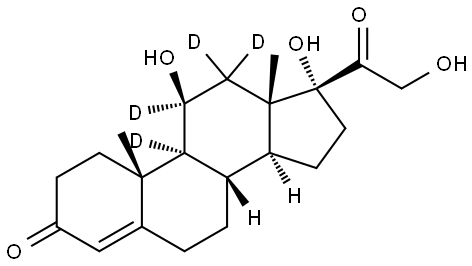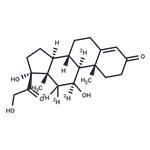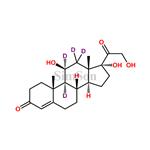Description
Hydrocortisone-d
4 is intended for use as an internal standard for the quantification of hydrocortisone/cortisol by GC- or LC-MS. Cortisol, known as hydrocortisone when used as a therapeutic, is a glucocorticoid produced by the adrenal cortex in response to adrenocorticotropic hormone (ACTH). It is an agonist at the mineralocorticoid receptor (MR) and the glucocorticoid receptor (GR), with an approximately 6- to 10-fold greater affinity for MR. Cortisol production is increased during periods of stress, and it is a major effector molecule in the hypothalamic-pituitary-adrenal axis (HPA) stress response. Cortisol levels increase with age and are often elevated in major depressive disorder, certain forms of hypertension, and Parkinson''s disease.
Chemical Properties
White Solid
Uses
Anti-inflammatory hormone
Uses
Labelled Cortisol (H714615). Cortisol, or Hydrocortisone, is a steroid hormone, more specifically a glucocorticoid, produced by the zona fasciculata of the adrenal gland. Cortisol is released in response to stress and a low level of blood glucocorticoids. Its primary functions are to increase blood sugar through gluconeogenesis; suppress the immune system; and aid in fat, protein and carbohydrate metabolism.
General Description
Cortisol, also known as hydrocortisone, is a glucocorticoid produced by the adrenal gland. This stable labeled internal standard is suitable for quantitation of cortisol levels in whole blood by LC-MS/MS for newborn screening of congenital adrenal hyperplasia (CAH) and in serum or plasma by LC-MS/MS for determination of several diseases including Cushing′s syndrome, Addison′s disease, and Sheehan′s syndrome.



